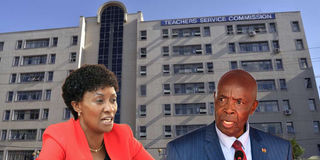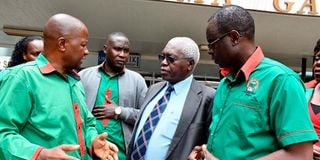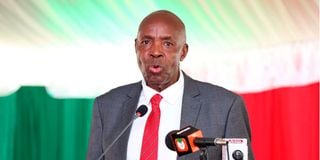
Teachers Service Commission CEO Nancy Macharia (left) and Education Cabinet Secretary Ezekiel Machogu. The Nation has pieced together details of the infighting between the teachers employer and the ministry.
The power to control over Sh435 billion allocated for basic education and a 365,000-strong teaching workforce is at the centre of the sibling rivalry between the Ministry of Education and the Teachers Service Commission (TSC).
The Nation has pieced together details of the infighting that’s been sparked by a bid to amend the Teachers Service Commission Act, 2012. Last week, the TSC called a meeting to discuss the proposals made in the Teachers Service Commission (Amendment), 2024.
Ministry officials snubbed the event despite having been invited. In the letter, the Ministry of Education had been invited as “a stakeholder”, something that was not well-received at Jogoo House.
The Kenya National Union of Teachers (Knut) also gave the event a wide berth but the Kenya Union of Post Primary Education Teachers (Kuppet) and the Kenya Union of Special Needs Education Teachers attended.
Also Read: TSC rejects proposals on education reforms
Senior ministry officials have criticised the Bill, saying, it is in bad faith and is intended to counter recommendations of the President Working Party on Education Reforms (PWPER) on changes in basic education, which could strip some of the TSC’s powers and transfer them to the Ministry of Education.

Kenya National Union of Teachers officials (in green) with PWPER chairman Raphael Munavu at the University of Nairobi on November 11, 2022.
Officials now argue that, if passed, Teachers Service Commission (Amendment), 2024 would make the TSC more powerful, negating the PWPER proposals that sought to balance power and influence between the TSC and the Ministry of Education and redistribute some functions which, in effect, would reallocate the finances.
In the 2023/2024 financial year, the entire education sector has been allocated Sh628.6 billion representing a 27.4 per cent of the national budget. Out of this, the TSC got the lion’s share at Sh316.7 billion for the management of its 365,000 employees.
Other major allocations to the basic education sector include Sh65.4 billion for the Free Day Secondary Education (FDSE) programme, Sh25.5 billion for junior school, Sh12.5 billion for Free Primary Education (FPE), Sh5 billion for the school feeding programme and Sh2.7 billion for the Secondary Education Quality Improvement Project. Sh1.3 billion has also been budgeted for the training of teachers on the competency-based curriculum.
Whereas TSC has been training teachers, the PWPER recommended that the function be transferred to the ministry. Sh6 billion has been set aside to develop infrastructure in primary and secondary schools.
The bone of contention is that, although the ministry disburses funds to schools, it has no control over their usage. The PWPER had recommended that headteachers and principals act as agents of the Ministry of Education and be answerable to it. The Bill does not fix the issue.
The ministry has influence in higher learning, where Sh97.5 billion has been allocated for university education, Sh30.3 billion to the Higher Education Loans Board and Sh5.2 billion to technical and vocational education and training institutions in capitation funding.
“Whenever we detect mismanagement of funds, we only write to the Basic Education principal secretary, who then recommends punishment by the TSC. This hardly happens. Some of the principals are contemptuous of us because they know we’re powerless,” a regional director of education told the Nation.
Another regional education boss said the ministry is mullin g removing headteachers implicated in financial mismanagement as signatories of school accounts.
“Schools belong to the Ministry of Education and not the TSC. The 2010 Constitution created a lacuna that needs to be resolved,” the official said.
The Nation understands that the introduction of the payment of school fees through the eCitizen platform is an attempt to reign in rogue school heads and make them accountable to the central government. The directive has been suspended by the High Court pending determination of a case filed seeking to block it.

Education Cabinet Secretary Ezekiel Machogu.
Education Cabinet Secretary Ezekiel Machogu was measured in his words when we sought his comment on the conflict.
“I’m the head of the entire Education sector. I don’t want to be distracted by sideshows. We’re focused on implementing the recommendations of the PWPER. We have an advisory committee in place overseeing all the amendments,” he told the Nation.
Interviews with insiders revealed that the TSC had a representative in the sub-committee that is chaired by Prof Collins Odote but withdrew them after just one appearance.
“This [amendment] is dead on arrival,” a senior official who sought anonymity told the Nation.
“There’s a structure to be followed. Before calling for public participation on the draft Bill, have presented it within that structure. All amendments to laws affecting a sector are presented before the Cabinet by the CS before being tabled in Parliament,” the source said.
The Nation has, however, established that the office of Deputy President Rigathi Gachagua will be used to present the Bill before the Cabinet, bypassing Mr Machogu. The DP’s office is also trying to defuse the conflict before it plays out in the open, thereby exposing the fissures in government operations.
Executive Order Number 2 of 2023 mandates the Office of the Deputy President to act as “liaison with constitutional commissions and independent offices in matters that require intervention by the national government including budgets, policy formulation and implementation of their recommendations”.
The DP’s office has been instrumental in resolving an almost similar spat between the National Police Service and the National Police Service Commission.
Additionally, the DP’s office is charged with the responsibility of overseeing public sector reforms, including in the education sector. The State Department for Cabinet Affairs is domiciled at the Office of the Deputy President.
On Wednesday last week, during the forum held at the Kenya School of Government in Nairobi, TSC boss Nancy Macharia said the draft Bill might undergo more changes.
“What will be presented today are proposals,”she told participants. “We are, therefore, kindly urging you to give us feedback, which will be incorporated in the document and subjected to further consultations.”
Attorney-General Justin Muturi told the Nation the Bill has not yet been taken to his office for legal advice.
“I’ve not seen it. When agencies want to amend any laws affecting their operations, they draft and bring them to us. We neither change nor provide the content,” Mr Muturi said.
The PWPER report had observed duplication of some functions between the ministry and TSC and recommended that they be harmonised.
“The management and running of schools is the responsibility of the national government through the Ministry of Education. TSC’s role is to the teacher as a professional and employee. TSC may decentralise its services, but the same should be in regard to the human resource function only,” the report reads. “Although teachers are employees of TSC, they work for the ministry.”

Teachers Service Commission CEO Nancy Macharia.
The report proposed the transfer of quality assurance from TSC to the Ministry of Education. This function, PWPER noted, had been misinterpreted in the TSC Act, 2012 and TSC Code of Regulations for Teachers.
“The function of quality assurance and standards is the sole function of the [Ministry of Education],” the PWPER observed.
The responsibility of the TSC, it said, “should be to the teacher as a professional and employee within the framework of performance evaluation.”
Teacher performance evaluation was similar assessments in other sectors of in the civil service and should be undertaken by the line ministry.
Knut Secretary-General Collins Oyuu told the Nation they boycotted the public participation event as they did not wish to be seen to have endorsed it.
“In 2019, when [then Knut boss] Wilson Sossion sent [then Chairman] Mudzo Nzili to attend a public participation meeting on the Teachers Professional Development, Knut was recorded among the attendees that endorsed it. TSC later argued that we had turned around to oppose a process we were involved in. On these amendments, we were advised not to attend,” he said.
Consultative meeting
Knut last Tuesday wrote to TSC demanding a consultative meeting in seven days. By Friday, they had not received a reply.
“TSC is more interested in power than teacher management. In that draft Bill, there is no mention of collective bargaining agreements, meaning the commission doesn’t recognise unions in matters relating to the remuneration of teachers. This Bill is intended to kill the negotiation power of unions,” Mr Oyuu said.
His Kuppet counterpart Akello Misori defended the union’s officials for attending the stakeholders’ meeting. He said Kuppet supported education reforms but objected to the TSC being given more powers.
“New changes to its powers should help fix gaps that impede the TSC’s effectiveness and the welfare of teachers. These gaps include administrative bottlenecks on promotions, bureaucracy on disciplinary process, and conflict of interest between TSC’s role as employer and regulator,” Mr Misori told the Nation.
Mr Sossion recalled that, during the drafting of the 2010 Constitution, Knut supported the autonomy of TSC but only as a body that would “walk with the CS for Education”.
“The autonomy we envisaged was one of resources but not to the extent of creating too many conflicts,” he told the Nation.










